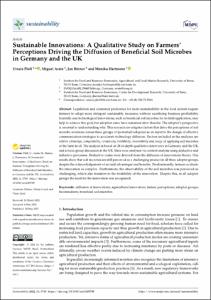Ploll, Ursula; Arato, Miguel; Börner, Jan; Hartmann, Monika: Sustainable Innovations: A Qualitative Study on Farmers’ Perceptions Driving the Diffusion of Beneficial Soil Microbes in Germany and the UK. In: Sustainability. 2022, vol. 14, iss. 10, 1-23.
Online-Ausgabe in bonndoc: https://hdl.handle.net/20.500.11811/10745
Online-Ausgabe in bonndoc: https://hdl.handle.net/20.500.11811/10745
@article{handle:20.500.11811/10745,
author = {{Ursula Ploll} and {Miguel Arato} and {Jan Börner} and {Monika Hartmann}},
title = {Sustainable Innovations: A Qualitative Study on Farmers’ Perceptions Driving the Diffusion of Beneficial Soil Microbes in Germany and the UK},
publisher = {MDPI},
year = 2022,
month = may,
journal = {Sustainability},
volume = 2022, vol. 14,
number = iss. 10,
pages = 1--23,
note = {Legislation and consumer preference for more sustainability in the food system require farmers to adopt more stringent sustainably measures without sacrificing business profitability. Scientific and technological innovations, such as beneficial soil microbes for in-field application, may help to achieve this goal, but adoption rates have remained slow thus far. The adopter’s perspective is essential to understanding why. This research investigates factors that drive the perceptions of soil microbe solutions across three groups of (potential) adopters as an input to the design of effective communication strategies to accelerate technology diffusion. Factors included in the analyses are relative advantage, compatibility, complexity, trialability, observability and image of applying soil microbes at the farm level. The analysis is based on 28 in-depth qualitative interviews in Germany and the UK, and a focus group discussion in the UK. Data were analysed via content analysis using deductive and inductive processes. Deductive codes were derived from the diffusion of innovations theory. Our results show that soil microbes are still perceived as a challenging product in all three adopter groups, despite the acknowledgement of several advantages and benefits. Predominantly, farmers evaluate the innovation as complex. Furthermore, the observability of the soil microbes was perceived as challenging, which also transfers to the trialability of the innovation. Despite this, in all adopter groups the need for the innovation was recognized.},
url = {https://hdl.handle.net/20.500.11811/10745}
}
author = {{Ursula Ploll} and {Miguel Arato} and {Jan Börner} and {Monika Hartmann}},
title = {Sustainable Innovations: A Qualitative Study on Farmers’ Perceptions Driving the Diffusion of Beneficial Soil Microbes in Germany and the UK},
publisher = {MDPI},
year = 2022,
month = may,
journal = {Sustainability},
volume = 2022, vol. 14,
number = iss. 10,
pages = 1--23,
note = {Legislation and consumer preference for more sustainability in the food system require farmers to adopt more stringent sustainably measures without sacrificing business profitability. Scientific and technological innovations, such as beneficial soil microbes for in-field application, may help to achieve this goal, but adoption rates have remained slow thus far. The adopter’s perspective is essential to understanding why. This research investigates factors that drive the perceptions of soil microbe solutions across three groups of (potential) adopters as an input to the design of effective communication strategies to accelerate technology diffusion. Factors included in the analyses are relative advantage, compatibility, complexity, trialability, observability and image of applying soil microbes at the farm level. The analysis is based on 28 in-depth qualitative interviews in Germany and the UK, and a focus group discussion in the UK. Data were analysed via content analysis using deductive and inductive processes. Deductive codes were derived from the diffusion of innovations theory. Our results show that soil microbes are still perceived as a challenging product in all three adopter groups, despite the acknowledgement of several advantages and benefits. Predominantly, farmers evaluate the innovation as complex. Furthermore, the observability of the soil microbes was perceived as challenging, which also transfers to the trialability of the innovation. Despite this, in all adopter groups the need for the innovation was recognized.},
url = {https://hdl.handle.net/20.500.11811/10745}
}






